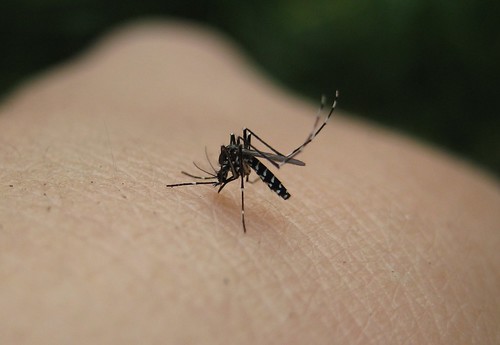(This article was originally written for Th!nk About It: Developing World).
So, I was researching around the web for my trip next week to the Global Voices Summit in Chile, and suddenly I found myself reading the guide on Lonely Planet about my country. I was a bit of a stroke to see all the listed diseases they prevent travelers from while visiting Venezuela. Alphabetically, they list the following: Brucellosis, Cholera, Dengue (breakbone fever), Hepatitis a, Hepatitis b, Hiv/aids (of course), Leishmaniasis, Measles, Rabies, Schistosomiasis, Tick-borne relapsing fever, Typhoid fever, equine encephalitis, and Yellow fever.
So, suddenly I became afraid of living in my own country.
I knew we had a lot of issues regarding pandemic diseases, but then I understood I was misinformed, so I started reading about this.
In 2009, we had 61.688 cases of dengue and 33.805 cases of malaria, which means those diseases rose in 12,7% and 38% respectively. Apparently, 14 people died of dengue last year, but that doesn’t appear in official statistics. Actually, “official statistics” are not accessible: you can prove that by yourself by entering the website of the Ministry of Health, and clicking “Estadísticas”.
So, I was researching around the web for my trip next week to the Global Voices Summit in Chile, and suddenly I found myself reading the guide on Lonely Planet about my country. I was a bit of a stroke to see all the listed diseases they prevent travelers from while visiting Venezuela. Alphabetically, they list the following: Brucellosis, Cholera, Dengue (breakbone fever), Hepatitis a, Hepatitis b, Hiv/aids (of course), Leishmaniasis, Measles, Rabies, Schistosomiasis, Tick-borne relapsing fever, Typhoid fever, equine encephalitis, and Yellow fever.
So, suddenly I became afraid of living in my own country.
I knew we had a lot of issues regarding pandemic diseases, but then I understood I was misinformed, so I started reading about this.
In 2009, we had 61.688 cases of dengue and 33.805 cases of malaria, which means those diseases rose in 12,7% and 38% respectively. Apparently, 14 people died of dengue last year, but that doesn’t appear in official statistics. Actually, “official statistics” are not accessible: you can prove that by yourself by entering the website of the Ministry of Health, and clicking “Estadísticas”.
Malaria occurs in every South American country except Chile, Uruguay and the Falkland Islands (which we still know as Las Malvinas, but that’s a different discussion). I might be too specific about this: this is only one of nine indicators of goal number six (Fight VIH/Sida, Malaria and other diseases), but it's actually the one my government claims to have succesfully addressed. Malaria cases are increasing between 5 and 6% each year since 2001, but mortality related is under 1%, claims the government. In Bolivar, there is an malaria epidemy, since cases in 2010 have increased in 138% in comparison with 2009 (there have been reported 11.700 cases between january and april, only in this dependence). There isn't still a completely effective vaccine against this disease, though there is apparently a high rate of early diagnosis which contributes to lower the mortality rates.
Malaria is a very grave disease, specially for indigenous communities, who doesn't have access to primary health care or vaccines, and live in selvatic areas where there is more presence of mosquitoes.
A grain of sand: A bed-net.
The Cacique Isaias Rodriguez Anti-Malaria Project, founded by Steve Baker and his wife Peggy Belanker, with the support of AMURTEL (an international relief organization), the venezuelan Ministry of Health, and the Mayors Office from the municipality of Manapiare, delivers insecticide-treated mosquiteros (specially designed bed-nets for use with hammocks) to indigenous people who live in Amazonas State, Venezuela. It has been found that the use of treated bed-nets can reduce the incidence of malaria in a 60%. This organisation delivers mosquiteros, and not traditional bed-nets, because indigenous people don’t sleep in beds, but hammocks, and if provided of other kind of bed-nets, they won’t use them. These mosquiteros are the best protection against the spread of malaria available today, since they not only provide of a physical barrier between the person and the mosquitoes, but also kill those that come in contact with the net, and protect against another insect-spread diseases.
Within the project, last year they distributed 200 mosquiteros, and they plan to distribute 2000 more by next year, so that every person in Alto Venturi would have one. (They also brought vaccinators, lenses and dentists, since the zone doesn’t have medical facilities). Every $20 donated will pay for a treated mosquitero for the indigenous people from Alto Ventuari. You can read more about it here.
Within the project, last year they distributed 200 mosquiteros, and they plan to distribute 2000 more by next year, so that every person in Alto Venturi would have one. (They also brought vaccinators, lenses and dentists, since the zone doesn’t have medical facilities). Every $20 donated will pay for a treated mosquitero for the indigenous people from Alto Ventuari. You can read more about it here.
And more on this topic, in the very interesting article of fellow TH!NKer Bart Knols, "Malaria: When sudden beats chronic".
(The featured image belongs to naturegirl78 in Flickr, and it's under a Creative Commons license)

No comments:
Post a Comment